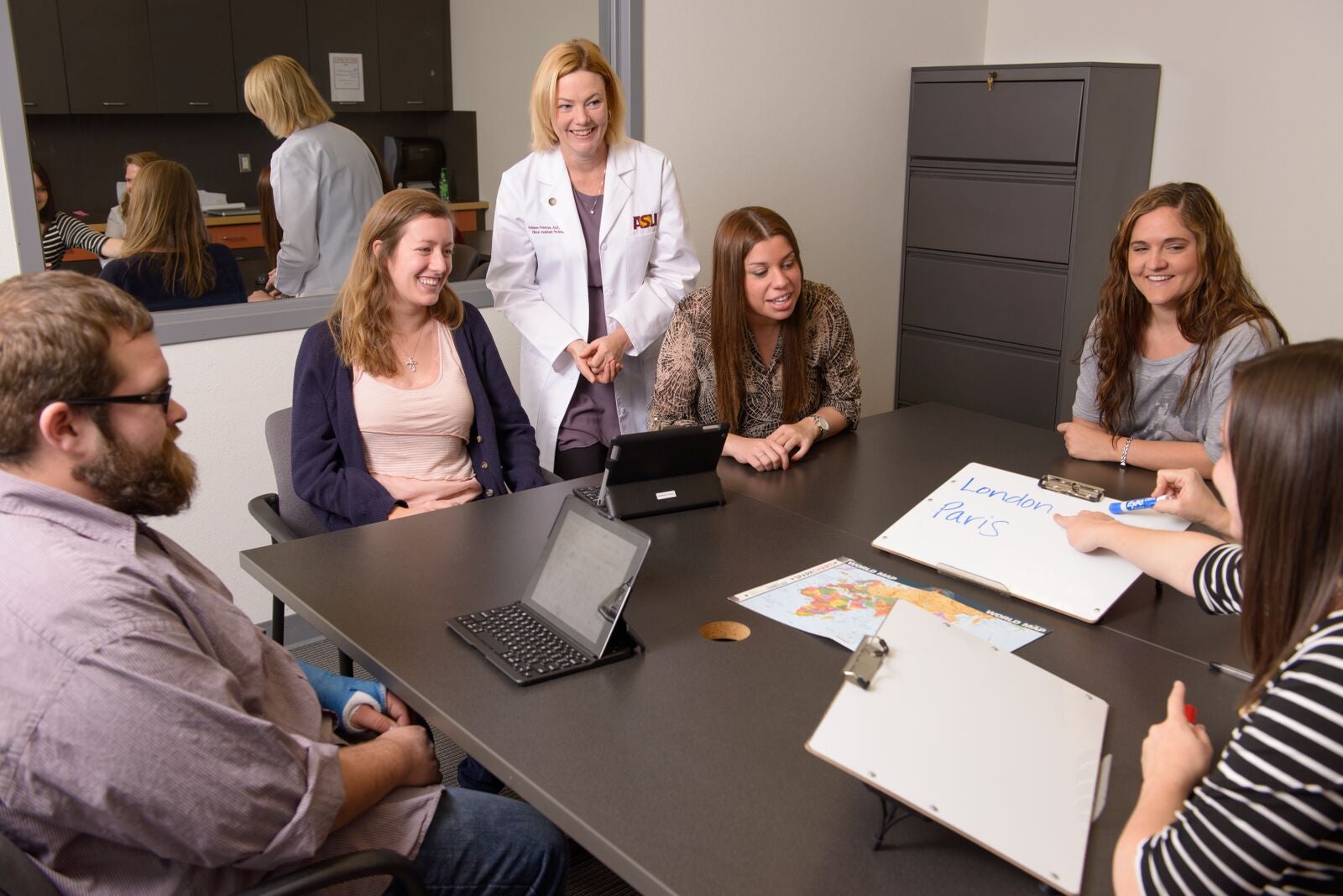Imagine going to Starbucks every morning and ordering a drink you don’t want because the one you do want is too hard to say. Imagine interviewing for a job when you can’t remember certain words. Imagine walking out of a summer movie with friends and not being able to express your opinion because you can’t keep up with their conversation.
These are very real situations for millions of Americans who live with speech and language disorders, and they can be even more frustrating for those who don’t have the tools to deal with them.
Kelly Ingram and Karen Gallagher, clinical associate professors in ASU’s Department of Speech and Hearing Science, have heard about such situations from clients at the department’s Speech and Language Clinic. The clinic offers two intensive summer programs for adults with aphasiaAphasia is the loss of ability to understand or express speech, caused by brain damage. and stuttering: Aphasia Communication Effectiveness (ACE) and Intensive Summer in Stuttering Therapy (InSIST).
Many of the clients they see at the clinic are no longer eligible to receive services through insurance. “So this is an inexpensive way for them to maintain their communication skills and have opportunities to communicate,” Gallagher said.
Another function of the programs is that they serve to train ASU speech and hearing graduate students for careers in the field. The graduate clinicians plan and oversee group sessions under the direction of ASHA-certifiedASHA, or the American Speech-Language-Hearing Association, is a professional association for speech-language pathologists, audiologists and speech, language and hearing scientists in the United States and internationally. ASU faculty, including Ingram and Gallagher.
According to Ingram, who also serves as director of the Speech and Language Clinic, social isolation is a real concern for people who have been living with speech and language disorders. It’s something that the aphasia program especially addresses, with a focus on group-based conversation.
ACE is a four-week program wherein clients can attend as many as four or as few as two, three-hour sessions each week. After an initial evaluation of clients’ needs, abilities and interests, topics of discussion are chosen.
In the past, sessions have incorporated book club and movie discussions, and even a classic car show in the parking lot outside the clinic where clients were able to chat with the car owners and ask questions.
Director of ASU's Speech and Language Clinic Kelly Ingram leads a group discussion with participants of one of the clinic's adult-based programs. Photo courtesy Lucy Wolski
“[The programs are] really driven by the people, the men and women who come here, and their interests,” Gallagher said, “and those can shift from year to year. So we have ideas, materials and resources, but it’s driven by the individuals who come.”
Ryan Calvert has been attending the aphasia clinic for several years since suffering a stroke in September of 2006. He went from not being able to remember simple articles like “he” and “she” to being able to get his thoughts out in a “smooth and succinct” way.
Calvert appreciates that the clinicians take into account his and other clients’ interests.
“What we really like is variety, so we conveyed that to the clinicians, and they took that suggestion and made a lot of changes that helped,” he said. He also appreciates their hands-off approach. “The clinicians kind of step back and let us just talk amongst ourselves, and that’s beautiful. Then, when they see there’s something lacking or there is a disconnect, they intervene accordingly, and that’s really helpful.”
InSIST consists of two, two-hour sessions per week, for four weeks, where clients meet one-on-one with clinicians for focused therapy as well as group interactions. It’s different than some traditional approaches to stuttering therapy, Gallagher said, because it’s condensed, time-wise, and therefore more intensive.
The adult-specific programs are also especially helpful to the ASU grad students who run them. While they get plenty of experience with kids through the several child-based programs offered by the Speech and Language Clinic, such as the Summer Program for Elementary Literacy and Language and the Pediatric Communication Clinic, the aphasia and stuttering clinics help them to get experience with adults.
“Our students need to be trained across the lifespan, from birth to death,” Ingram said.
Speech pathology grad student Taylor Lorengo has led both children’s and adults’ sessions. She said the adult programs have helped her appreciate clients as individuals with specific needs.
“That was something I really had to check in with, remembering they’re not kids,” she said. “The principles are similar but you just have to keep in mind the type of client that you have.”
Lorengo will graduate in May of 2018 and hopes to eventually work in acute care.
“You can see how beneficial these programs are to the people who are in them,” she said. “A lot of times out in the world, they don’t have people trained like we are to help them communicate. The time they get to come in and get someone like us to help them be successful is huge.”
More Health and medicine
Is ‘U-shaped happiness’ universal?
A theory that’s been around for more than a decade describes a person’s subjective well-being — or “happiness” — as having a U-shape throughout the course of one’s life. If plotted on a graph, the…
College of Health Solutions medical nutrition student aims to give back to her Navajo community
As Miss Navajo Nation, Amy N. Begaye worked to improve lives in her community by raising awareness about STEM education and health and wellness.After her one-year term ended last month, Begaye’s…

Linguistics work could improve doctor-patient communications in Philippines, beyond
When Peter Torres traveled to Mapúa University in the Philippines over the summer, he was shocked to see a billboard promoting Arizona State University.“It wasn’t even near the university,” said…

